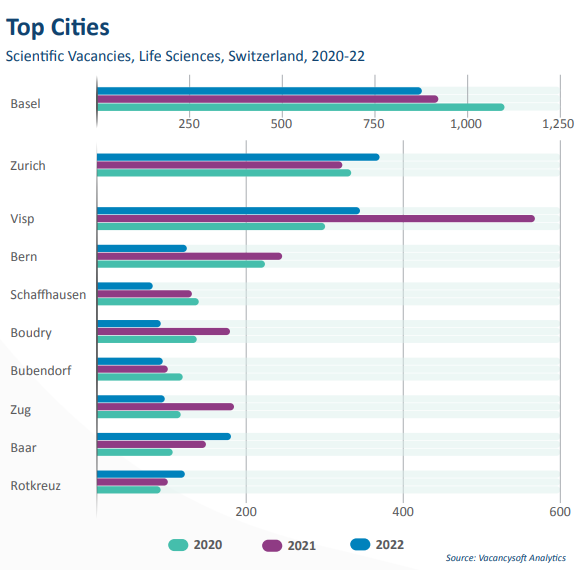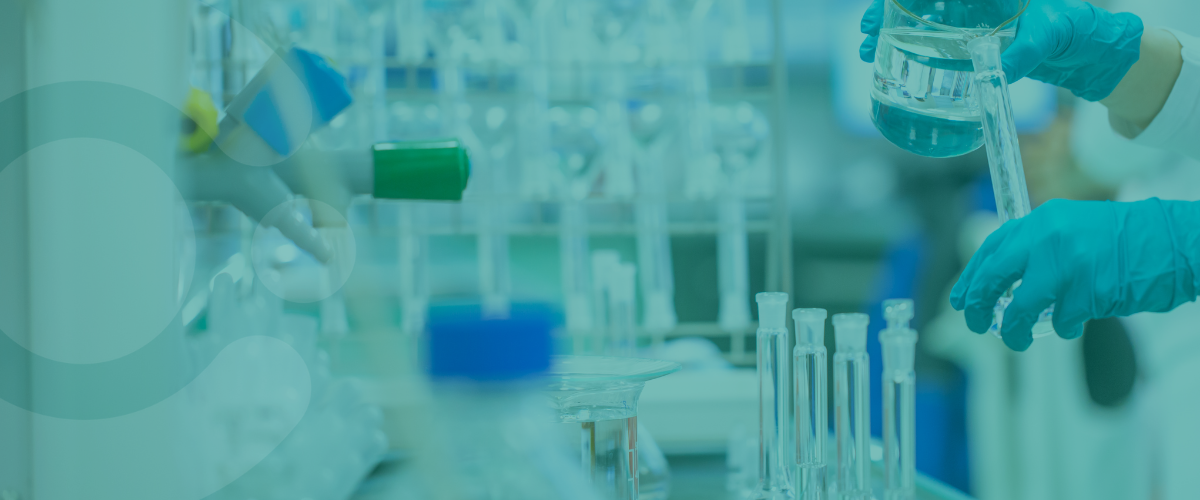Switzerland has long been an established centre for innovation in the life sciences industry. However, the city of Basel, idyllically nestled on the river Rhine in the northwest of the country, is a rising star—particularly in the field of biopharma.
Contents
The Rise of Basel as a Life Sciences Innovation Hub and Accelerator
Basel is home to over 700 life sciences companies and two of the biggest names in pharma—Novartis and Roche—have global headquarters in the city. It’s also home to large international pharmaceutical and manufacturing companies including Lonza, Johnson & Johnson, Boehringer Ingelheim, Syngenta, and Bayer.
However, the life sciences landscape in Basel is not exclusively made up of big pharma, far from it in fact. Many small and medium size companies, like Anaveon, Galapagos, Idorsia, BeiGene, NBE Therapeutics, Basilea, Nouscom, Myovant, and T3 Pharmaceuticals, add to the rich life sciences tapestry that makes up the Basel Area.
The Basel Area of Switzerland is an excellent incubator and accelerator for life science start-ups, thanks to its diverse ecosystem that can support longer-term growth. Basel is emerging as a leading life sciences cluster in Europe, attracting start-ups and global companies expanding their European operations.
The development of technology parks and research facilities, as well as academic institutions and a large talent pool of life science professionals, has made Basel a hotspot for life sciences activity and investment in recent years.
Strong Life Sciences Academic Tradition
For centuries Basel has been known as a centre for academic research. The University of Basel, founded in 1460, is one of the oldest universities in Europe. The university has a strong tradition in the life sciences, with a particular focus on pharmaceuticals.
Many of the key figures in the development of modern medicine, including Paracelsus and Johann Rudolf Geigy-Merian, were associated with the university and advances within the life sciences industry.
Within a one-hour drive of the Basel Area, you can find 14 universities spread across three countries. This offers life sciences companies access to a rich pool of life science graduates covering specialisms including pharmaceuticals, biotechnology, and medtech.
The city also hosts several global conferences, including the Swiss Innovation Forum, and Future Health Basel, bringing together many of the industry’s leading minds and opportunities for networking.
Favourable Business Environment
According to a report published by Savills, the Swiss pharmaceutical market totalled around $7 billion in 2019. At the same time, Swiss exports of pharmaceutical products reached more than $90 billion - representing almost 30% of all Swiss exports. Around 40% of the capital of European life sciences companies is traded in the SIX Swiss Stock Exchange.
Despite some geopolitical unrest and macroeconomic challenges, the Swiss stock market has fared well; however, it has not been completely spared, particularly for the biotech sector. Even during more turbulent economic times, the relative stability of the Swiss stock market gives life sciences companies in the region confidence to move ahead with plans.
The country also has attractive tax laws to encourage investment. In 2020, Switzerland introduced favourable tax incentives for pharmaceutical, biotech, and medtech companies to reward life sciences companies investing in research and development (R&D).
From an income tax point of view, those working in R&D who are involved in the design and development of, for example, restorative and regenerative solutions, biological solutions for enhanced diagnosis, or the identification and development of new chemical entities, pre-clinical research and development, also benefit from R&D tax deductions.
Switzerland is home to a large overseas life sciences workforce and one of the biggest ex-pat communities in Europe, with over 40,000 British Nationals in residence. The country's high quality of life, beautiful landscape, tax-friendly environment, and leading roles in global life sciences innovation make it an attractive destination for life sciences professionals.
The average disposable income of $43,035—one of the highest in the world according to World Population Review—offers an excellent standard of living.
With a reputation for being a business-friendly country, Switzerland enjoys a largely stable political environment, low taxes, and a highly skilled workforce. The World Economic Forum (WEF) rank Switzerland consistently as a country that provides extensive and high quality employee training, as well as for the highest skills set among graduates, globally.
Basel Labour Market Trends

Analysing the latest Cpl Life Sciences Swiss labour market report, published in partnership with Vacancy Soft, Sarah Goddard, Cpl Life Sciences Country Director Switzerland, comments,
“The number of employees in Swiss research and development (R&D) biotech companies is still on the rise, despite a dip across November and December 2022 that impacts the overall figures significantly.
Pharma remains, by volume, the largest recruiter with 85% of all vacancies (also 5% growth last year compared to biotech and CROs) with the larger companies such as Lonza, Novartis, Roche, leading again. However, CRO vacancies have decreased in some cases by nearly 50%, perhaps indicating a trend of in-house hiring for roles such as clinical, regulatory, data and statistics, etc., although some of these areas have also seen a general decrease.
The centre of hiring remains in Basel with around 35% of vacancies; Visp and Zurich also remained strong growth areas for vacancies across 2022. “
The Basel Area, specifically, has several advantages that make it an attractive location for life sciences companies. It is home to several major pharmaceutical companies and research institutions and has nearly 32,000 highly skilled life sciences professionals based locally.
The life sciences ecosystem in the Basel Area is built on strong foundations, with many leading firms making it home to their global headquarters. The high profile of these companies attracts other companies, creating a network of suppliers, service providers, and investors.
However, the hub structure of the Basel life sciences market, much like the Golden Triangle in the UK, means competition for talent is fierce. For life sciences companies located in the Basel Area, a strong talent acquisition strategy is vital to remain ahead of the competition.
To attract the best talent, it is advantageous to engage with a specialist life science staffing agency that has regional and sector specific knowledge, as well as access to a large network of candidates.

Focus on Innovation
The spirit of collaboration in the Basel Area is tangible. Biotech start-ups and pharma companies come together to accelerate innovation, bringing drugs and medical device advancements to market more quickly, so patients can access new treatments faster.
The Basel Area is a hot bed of activity when it comes to the development of innovation parks and hubs. In 2020, Switzerland Innovation Park Basel Area opened its doors welcoming life sciences companies shaping the future of digital health and personalised health. Other similar development schemes include, BaseLink, Stücki Park, Klybeckplus, and Rosental Mitte—which has the potential to generate 8,500 jobs.
The city also has several successful initiatives in place to support innovation in the life sciences industry, including funding programs, incubators, and accelerators.
For instance initiatives like DayOne, which connect the life sciences industry with healthcare providers, academia, and the Swiss government to accelerate advancements in digital health and medtech. Start-ups and early-stage life science companies benefit from these programs, which provide the resources they need to develop new products, navigate legislation, networking, and technologies.
Conclusion
Basel’s continued rise as a life sciences innovation hub can be attributed to several factors, including its strong academic tradition, favourable business environment, collaborative culture, and focus on innovation. Switzerland is ranked as the UK’s 10th largest trade partner, with total trade in goods and services between the two countries reaching nearly £53 billion in 2022.
In a move that will only strengthen the Anglo Swiss trading relationship, Business and Trade Secretary, Kemi Badenoch, recently announced plans to modernise the existing trade agreement, which will provide life sciences companies in Switzerland and the Basel Area greater opportunities for trade and investment. As the life sciences industry continues to grow and evolve, Basel is likely to remain a key player in this important sector.
To learn more about life sciences jobs in Switzerland, get in touch with us today.
Contact us
Sources:
https://www.savills.com/research_articles/255800/317931-0#Basel
https://worldpopulationreview.com/country-rankings/disposable-income-by-country
https://dailybusinessgroup.co.uk/2023/05/swiss-talks-promise-new-trade-opportunities/
https://www.s-ge.com/en/life-sciences?ct
